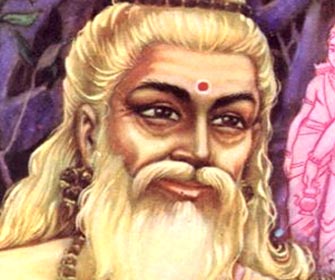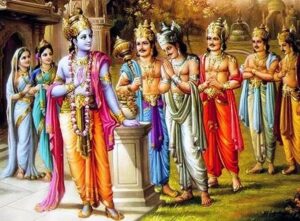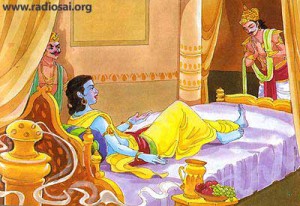Introduction to Kaushika’s Anger
Once, Sage Markandeya visited Yudhishthira Maharaja and told the following story – “I am no crane.”
Brahmana Kaushika was a strict brahmachari who was strong and steadfast in his austerities. He was well-versed in the study of Vedic scriptures.
Once, while he was sitting under a tree reciting the Vedas, a crane perched on the tree and defiled his head with droppings.
Kaushika became very angry and looked at the crane. Just by his angry look, the bird was killed and fell down dead.
Encounter with the Dutiful Housewife
Thereafter, another time, Kaushika went to beg alms.
He stood in front of a house where the housewife was busy cleaning utensils. When her husband arrived, she sincerely served him, washing and drying his feet and then feeding him.
After that, she came out with alms for the mendicant Kaushika and said, “Sorry, pardon me for keeping you waiting.”
Kaushika sarcastically chastised her for keeping a brahmana waiting.
The Housewife’s Wisdom
But she calmly replied, “Be not angry with me. Remember, I kept you waiting only because I was dutifully serving my husband. I am no crane to be killed by a violent thought. Your rage can do no harm to a woman who devotes herself to the service of her husband. O great one, you do not know the secret of duty, and you are also not aware that anger is the great enemy that dwells in man. Forgive the delay in attending to you. Go to Mithila and be instructed in the secret of good life by Dharmavyadha living in that city.”
The Brahmana, feeling apologetic, thanked the lady and went to Mithila to meet Dharmavyadha. He expected to find a lonely hermitage but instead reached a butcher’s shop where a man was selling meat. He was astonished to learn that this man was Dharmavyadha.
Learning from Dharmavyadha
The Brahmana was shocked beyond measure and stood at a distance in disgust. The butcher suddenly rose from his seat, came to the Brahmana, and inquired, “Revered sir, are you well? Did that chaste Brahmana lady send you to me?”
Kaushika Brahmana was stupefied.
The butcher said, “Let us go to my home.” The Brahmana saw there a happy family and was greatly struck by the devotion with which Dharmavyadha served his parents. He took his lessons from the butcher on dharma, man’s calling, and duty. Afterwards, Kaushika returned to his house and began to tend to his parents’ duty, which he had rather neglected before.
Moral of the Story
The moral of this striking story of Dharmavyadha, so skillfully woven by Vyasadeva into the Mahabharata, is the same as the teachings of the Gita: that man reaches perfection by the honest pursuit of whatever calling falls to his lot in life, and that this is really worship of God who created and pervades all.
The occupation may be one he is born to in society, it may have been forced on him by circumstances, or he may have taken it by choice, but what really matters is the spirit of sincerity and faithfulness with which he does his life’s work.
Vyasa Bhagavan emphasizes this great truth by making a scholarly Brahmana who did not know it, learn it from a butcher who lived it in his humble and despised life.
Lord Sri Krishna says in Bhagavad Gita 18.46-47:
yatah pravrtir bhutaanaam / yena sarvam idam tatam sva-karmanaa tam abhyarcya / siddhim vindati maanavah
“By worship of the Lord, who is the source of all beings and who is all-pervading, a man can attain perfection through performing his own work.”
shreyaan sva-dharmo vigunah / para-dharmaat sv-anushtitaat svabhaava niyatam karma / kurvan naapnoti kilbisham
“It is better to engage in one’s own occupation, even though one may perform it imperfectly, than to accept another’s occupation and perform it perfectly. Duties prescribed according to one’s nature are never affected by sinful reactions.”
Hare Krishna, Hare Krishna, Krishna Krishna, Hare Hare Hare Rama, Hare Rama, Rama Rama, Hare Hare.



